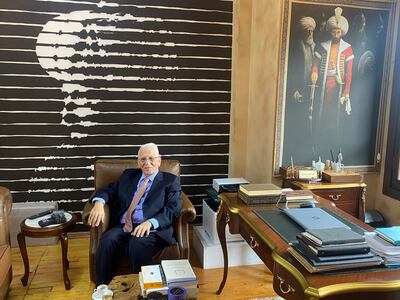“There is a saying in Arabic – ‘Al kitaab khayr al sadiq’ – a book is a best friend," says Ersat Hurmuzlu, from a brown leather chair in front of a large graphic wall hanging of Ottoman sultan Mehmet the Conqueror. "People don’t read too much now because of social media and so on. We are now defending our best friend.”
Mr Hurmuzlu is not only determined to spare books and reading from modern-day distractions. He is also aiming to use literature to create better bonds between Turks and Arabs by translating books, especially by Palestinian authors.
“We noticed that the translation between these two languages, Arabic and Turkish, is weak," he says, sipping from a tiny cup of Turkish coffee. “We said that one of our aims should be to encourage translation between these two important languages.”
Mr Hurmuzlu, who flits between fluent English, Arabic and Turkish in conversation, established Bab El Amud publishing house in Istanbul about a year ago alongside Khalil Assali, a Jerusalem-based writer who has long-standing ties with Turkey.

The publishing house, set up in a restored wooden building in Istanbul’s Zeytinburnu district, is named after one of the seven gates into the old city of Jerusalem – a city that resonates with both Arabs and Turks, given its central importance in Islam.
Bab El Amud’s aim is to bring Turks and Arabs together and improve relations between two peoples that, throughout history, have not always been on the best terms. The Ottoman Empire ruled over Arab lands for centuries, before Britain and other colonial powers backed Arab revolts against Ottoman rule.
Between Arabs and Turks, “there are not only stereotypes, but also prejudgements. We have to demolish this,” says Mr Hurmuzlu, who served as a senior adviser to former Turkish prime minister Abdullah Gul.
Mr Hurmuzlu is putting politics to the side for now, though. "We are not involved in politics,” he says. “We are focusing on literature about brotherhood and dialogue.”
So far, Bab El Amud has published 11 titles. On the ground floor of the two-storey building, furnished with handwoven rugs and elegant Arabic calligraphy, workers sellotape boxes of books to be sent to distributors in Beirut and Amman. The publishing house is also in talks with a distributor in Riyadh, Mr Hurmuzlu says, to expand its titles’ reach across the Middle East.

The founders took a decision to base the firm in Istanbul rather than Jerusalem or elsewhere.
"There is, you know, better room for movement here in Istanbul,” says Mr Hurmuzlu, whose family originated in the Turkish city of Konya before spreading as far as Baghdad and Mosul in Iraq.
The aim is “to introduce Arabic and Turkish literature to each other - Arabic works and literature to Turkish people, and to translate Turkish literature into Arabic," said Dr Halit Eren, one of Bab El Amud’s four directors and former director of the Organisation of Islamic Co-operation’s Research Centre For Islamic History, Art and Culture.
Bab El Amud’s founders hope is that the two cultures will have access to better information and more context about each other through translated literature and history.
co-founder of Bab El Amud publishing house
“Jerusalem means a lot to Turks, given the importance of Al Aqsa mosque – but they don’t know much about the city,” says Khalil Assali, over the phone from Jerusalem. “We want to provide them with more information so they better understand the city. The same for the Arabs of the Gulf and other regions about Turkey – they like Turkey, but don’t know much about it.”
One work published so far is a translation into Turkish of Palestinian author Mahmoud Shukair’s Ceiling of Desires, a collection of very short stories about Jerusalem told through tales of love.
“It was shame, because Shukair has around 70 books, including for children and so on,” says Mr Hurmuzlu, who did the translation. “And these books have been translated into English, French, Italian, Chinese but not into Turkish. So we said, we have to start this, and we did so with this one.”
Bab El Amud has also published an Arabic translation of the travelogue through modern-day Palestine, Lebanon and Syria of Evliya Celebi, a famous Ottoman explorer. The 159-page book, Evliya Celebi and the Jerusalem Journey, was first translated from Ottoman Turkish into modern-day Turkish, and then into Arabic. The plan is to next publish another section of Celebi’s writings, detailing his journeys through Iraq and modern-day southern Turkey.
A third book is the translation into Arabic of Yilmaz Oztuna’s Turkish history before the Ottoman era – a rendering aimed at widening understanding of older parts of the country’s past.

The publishing house is still in its early days, but the response from readers has been positive, Mr Hurmuzlu says.
“We are relatively new, but people admired this, and they expressed their support to us,” he says.
Bab El Amud recently exhibited at Istanbul’s International Arabic Book Fair, which this year attracted more than 63,000 visitors and brands itself as the largest show of Arabic literature outside the Arab world.
Khalil Assali believes that Bab El Amud’s offering of cultural and historical books distinguish it from “commercial” publishing and translation houses that select works by the four or five biggest authors.
“We offer something different,” he says.
Mr Assali also believes that the project has gained importance since the October 7 Hamas attacks, the ongoing Israeli war in Gaza, and widespread violence in Israel and Palestine. Turks are widely supportive of Palestinian issues but leaving behind a legacy of building bonds through books is key, he says.
“We want to leave something for the next generations of Arabs and Turks,” he explains.
“This is to show them that despite the difficult conditions – and indeed we are living under extreme stress in Jerusalem at the moment – that we left a legacy of literature, and connections between the two peoples.”


